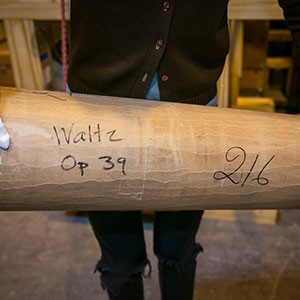The University of Oklahoma’s American Organ Institute Archive and Library will preserve and provide public access to a unique organ recording collection with a first-ever grant from the GRAMMY Foundation. With this funding, the Institute continues its contribution to the legacy of organ music and the GRAMMY Foundation’s mission to preserve the nation’s vast recorded heritage.
“This grant is another example of the national and international stature of OU’s American Organ Institute,” said OU President David L. Boren. “It plays a crucial part in the preservation of the role of organ music in our society.”
The $20,000 grant will allow the Institute to restore the collection’s most treasured items, some of which are made of paper. The collection consists of 760 original and irreplaceable master organ player rolls (weighing in at 16 tons) produced by the Möller Pipe Organ Co. in the early 1920s, including organ arrangements by notable performers of the 20th century.
“This grant from the GRAMMY Foundation recognizes the extreme cultural and musical value of the Möller master rolls held by the American Organ Institute at the OU School of Music,” said Institute Director John Schwandt. “This is an important part of our mission to preserve the musical tradition of the pipe organ and reintroduce it to modern audiences in new and exciting ways, and we look forward to the time when we are able to present the finished product of this project to the public.”
The collection also includes a one-of-a-kind perforator mechanism used to create daughter rolls from master rolls. The master rolls are made of heavy bonded paper and were cut by hand. They are significant for their musical content and value to the history of the process involved in making this music. Many well-known artists of that period recorded for Möller. Classical, jazz, popular, patriotic and religious music of the early 20th century can be reproduced in full fidelity. The specific technology used in creating the master rolls was proprietary and cannot be duplicated, Schwandt said. If they are not restored, the technology and the music will be lost, he said.
The technology for player rolls had been around for hundreds of years before Möller perfected the art form. The player rolls produced from these master rolls were fed into Möller’s Artiste roll player mechanisms for performances on pipe organs in private residences, music halls, funeral parlors and churches. The Möller system is recognized by many as the best roll player system ever created by an organ firm. The Institute is restoring an Artiste player to be installed on the Möller Municipal Symphonic Organ Opus 5819 in OU’s Paul F. Sharp Concert Hall. In this way, modern audiences can hear live performances of music created more than 80 years ago.
Nearly forgotten for decades, the rolls are in delicate condition – each roll is needing conservation work as soon as possible. The preservation and digitization of these rolls will result in much greater access to the rolls and the music contained within them. The Institute regularly offers opportunities for the public to view the entire collection, the restoration of the one-of-a-kind Möller perforator mechanism and ongoing organ restoration work.
Led by Schwandt, the Institute’s program has grown in number of students and stature. The academic program emphasizes organ performance, church music and organ technology, and a theatrical organ and silent film accompaniment curriculum is being designed. The pipe organ workshop is home to the restoration of the Möller Opus 5819, acquired in 2006 for the Paul F. Sharp Concert Hall at the OU School of Music. OU is the only university in the nation with a complete working pipe organ shop devoted to teaching.
For more information about OU’s American Organ Institute and opportunities to view the ongoing restoration work, visit the website at http://aoi.ou.edu.



